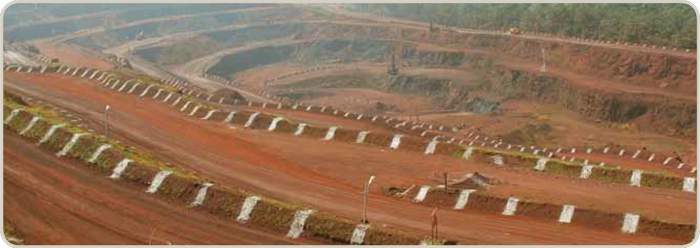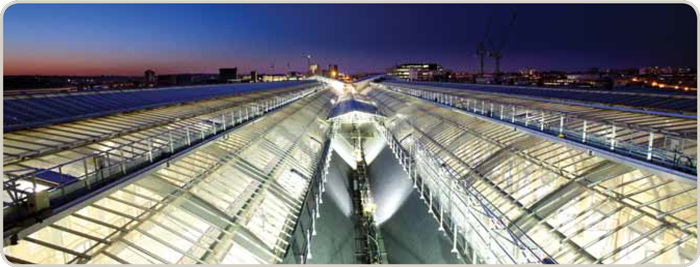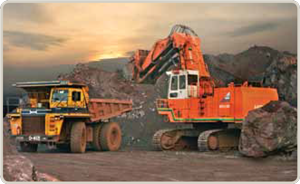
Ensuring raw material security for Tata Steel, India
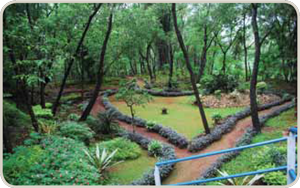
Committed to environment conservation, Noamundi, India
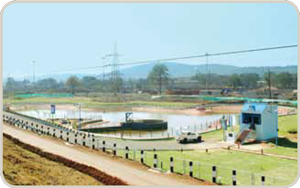
Water Harvesting Park, Joda, Odisha
|
ENSURING SUSTAINABLE MINING
With almost a century of experience in mining raw materials safely, efficiently and sustainably, Tata Steel’s long-term strategy is to have as much control as possible over its raw material resources and to ensure security of supply for its operations globally.
The activity of mining globally creates externalities for people and planet that needs to be understood, minimised and compensated in such a way that the net outcome of the process is positive, leading to sustainability in mining. Tata Steel has not only endeavoured to comply to all regulations and mining laws applicable in the country but it has strived to always be ahead of regulations through adoption of best practices, modern technologies, and innovation to ensure that its mining activities are efficient causing minimum environmental impact, and leading to social development in the neighbouring communities.
The Company has adopted best practices for monitoring and management of environmental parameters including ambient air quality levels and dust suppression arrangements, water impact, noise level, waste and fines generation and rejections etc. Some of the initiatives taken by Tata Steel are as under:
 |
To ensure gainful use of the extra-fine iron ore fines which are generated while mining and processing, Tata Steel has implemented a 6 million tonnes per annum pelletising plant in Jamshedpur which converts these fines into pellets for use as replacement of iron ore lumps as a blast furnace feed. This also leads to significant energy savings in the blast furnace operations. The Pellet Plant was commissioned in the end of Financial Year 2012-13 and has reached near full capacity in Financial Year 2013-14, and plans are being made to de-bottleneck the capacity further in Financial Year 2014-15. |
 |
Due to process optimisation of iron ore classification, the plants at Noamundi and Joda East Iron Mines have been able to not only improve products in terms of alumina, but also significantly increase the opportunity for feeding higher alumina ore to the processing plants. This will enable the plant to reduce coke consumption and increase blast furnace productivity. |
 |
In its effort to address environment issues, the Company uses a fuel additive to reduce consumption of diesel in mining machineries, thus minimising emissions and optimising costs. |
 |
The use of discarded 1 litre plastic bottles in an eco-friendly air decking method to improve blast parameters in open cast iron mines has resulted in an approximate 10-12% direct savings, due to replacement of bulk explosives (SME) by bottles. |
 |
The use of Vetiver grass for stabilisation of dump slope to prevent soil erosion has proven to be an excellent innovation for stabilisation of over burden and sub-grade dumps of iron ore mines in the days to come. |
 |
Since 2009-10, the Company’s practice of replacing conventional electric street lights phase wise with solar ones in the Mines Division has resulted in a net monetary saving of Rs. 33 lakhs/annum and avoided CO2 emission of about 450 tonnes per annum to the atmosphere. The division has also extended this initiative to surrounding villages and installed around 600 solar street lights in and around the mining town. |
 |
To conserve rainwater, the Company has installed rainwater harvesting structures along with ground water recharge facilities at 8 different locations of the Mines Division including surrounding villages. This has resulted in savings of surface runoff water while also leading to gradual and steady rising of ground water table in the project sites and downstream villages in and around the mines. |
 |
A man riding car was commissioned for degree III underground mines. The man riding car has reduced the travelling time and the arduous journey for employees, thus increasing their safety and productivity. This car travels in a gradient of 1 in 8 for a distance of 1 km. |
Some of the other sustainability initiatives undertaken by the Company include the setting up of a Sewerage Treatment Plant at Noamundi, establishing ‘green buildings’ near mines, planting around 1,11,300 saplings since 2008-09 in Iron Ore mines alone for progressing reclamation measures and ensuring ambient air, and noise quality is maintained well within the prescribed limit.
Tata Steel is committed to ensuring sustainable mining through its operations spread over the world. Tata Steel Minerals Canada (TSMC) accepts social and environmental responsibility for its mining projects through: respectful and effective partnership with aboriginal nations; respect for the environment and its sustainable development; economic growth for the community; and empowerment and capacity-building.
TSMC, in conjunction with the local Aboriginal Peoples, is committed to taking appropriate measures to mitigate
the environmental, economic, social, cultural or spiritual impact of any development activity carried out by TSMC. Its Direct Shipping Ore Project has been subject to thorough environmental impact assessment under the laws of Quebec and Newfoundland, and Labrador and was granted release for all the aspects that might impact environment.
|
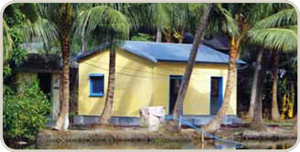
Nest-In – A mass housing solution by Tata Steel, India
|
 |
Silent Track, a breakthrough in R&D, makes use of technology to cut peak noise levels in half on rail lines that run through built up areas. This will allow train operators to meet growing transport demands without the extra decibels for trackside residents. The new technology has already allowed Thameslink trains in London to increase capacity through the recently redeveloped Blackfriars Bridge Station without any additional noise pollution for locals. |
 |
Nest-In is a mass housing solution developed jointly by Tata Steel Global R&D and Marketing and Sales; and is a product that is expected to revolutionise the rural and semi-urban markets for individuals and for communities. The solution uses light gauge steel sections joined together by a patented DippleClick technology to quickly erect houses by semi-skilled local people. Commercialisation was initiated in H2 Financial Year 2012-13 with the standard layout. Currently there are 12 layouts ranging from 100 to 650 sq. ft. in line with consumer requirements. Till date, more than 80,000 sq. ft. area has been covered under Nest-In, across India. |
 |
Tata Steel R&D together with CSIR-NML took up the challenge to develop a low cost, online and fast method for online sensing of alumina in iron ores. The online detection of alumina is crucial as iron ore fines in India have 3~5.5% of alumina compared to 1% worldwide, thus affecting blast furnace productivity. This initiative resulted in an innovation that enables the blast furnace operation to decide on effective blend planning and impurity reduction. The innovation has been protected by two patents. |
 |
Bake Hardened 260 is a new hi-tech steel grade developed by Tata Steel Europe, which protects cars from dents and makes door and bonnets 7% lighter. The lighter steel will improve cars’ fuel efficiency while a special strengthening technique enables vehicles to withstand everyday knocks in the car park. |
 |
Research on repeated failure of stirrups during earthquakes revealed poor workmanship and noncompliance of prescribed standards. To resolve this, Tata Tiscon developed Superlinks – stirrups made of high strength ribbed TMT reinforcement bar in commonly used sizes. Superlinks are manufactured through automatic and sophisticated machines, using strict quality control to ensure consistency, quality and accurate dimensions. Superlinks sales in Financial Year 2013-14 reached 7500 tonnes, an increase by 5 folds over Financial Year 2012-13. |
 |
Tata Steel’s Sustainable Building Envelope Centre (SBEC) in Europe has developed a range of colour-coated steel panels that use natural day light to heat homes, saving as much as 50% of a typical household annual fuel bill. This technology known as Colorcoat Renew SC absorbs about half of the light energy hitting its surface and generates as much as 500 watts per square metre – heating an average home with just five panels. |
 |
Tata Steel India has introduced Tiscon Readybuild – ready to use Rebars for construction projects. This addresses customer pain points related to unavailability of skilled labour, scrap loss, space constraint and pilferage at sites. Eight centres with a capacity of 1,80,000 tonnes per annum have been established across the country to supply Readybuild to 500+ sites annually. These centres are quality certified and provide doorstep service to the project sites. Readybuild centres are the first of their kind to be set up by a steel company in India. |
 |
PAVISE is an efficient and cost-effective armour developed by Tata Steel Europe, for military vehicles, as well as for defended infrastructure such as watch towers or sangars. It has now been tested up to NATO Standardization Agreement Level 4 to create armour capable of resisting both small arms and heavy machine gun fire with armour-piercing projectiles. |
 |
Phase Change Material (PCM) has been developed at Tata Steel’s Sustainable Building Envelope Centre (SBEC). When installed in a building, it reacts to the temperatures it is exposed to – as the room trends toward overheating, the phase change material melts and absorbs the excess heat. PCM self regulates the temperature of a room without the need for traditional heating or cooling devices. |
 |
Tata Steel has unveiled a range of sophisticated new electrical steel products which reduce electricity losses by 20-30% compared to conventional grain-oriented grades. The new products are being made by Tata Steel subsidiary, Cogent Power at their Orb works in Newport, South Wales. These high-grade products will make a significant contribution to the preservation of natural resources, by reducing energy lost in the generation and transmission of electricity.
|
 |
Tata Steel, JCB Landpower and GKN have teamed up to develop the Company’s most productive tractor yet. Using innovative design and engineering methods, engineers have been able to reduce the weight of the next generation of JCB Fastrac machines making them leaner on fuel consumption, able to handle bigger loads and
safer than previous models while retaining the strength required by farmers around the world. |
 |
To integrate new steels into the production processes seamlessly, Tata Steel has held Value Analysis Value Engineering (VAVE) workshops on 5 different auto models in 2012-13 in India. The weight saving across models has been 15-20 kgs per vehicle by the use of forming simulations and use of high strength steels. |
 |
Tata Steel in India has embarked on “Project Innovent” in Financial Year 2013-14 – a vehicle for consumer-in Innovation, aimed at creating new services and solutions businesses that can lead to higher margins and increased differentiation. The focus is on identifying significant stated and unstated consumer needs by using specific tools, and developing them into business concepts. These concepts, once approved, are tested in the market against specific action standards related to consumer acceptance, profitability and scalability. Successful pilots will be taken up for scale-up. |
|



